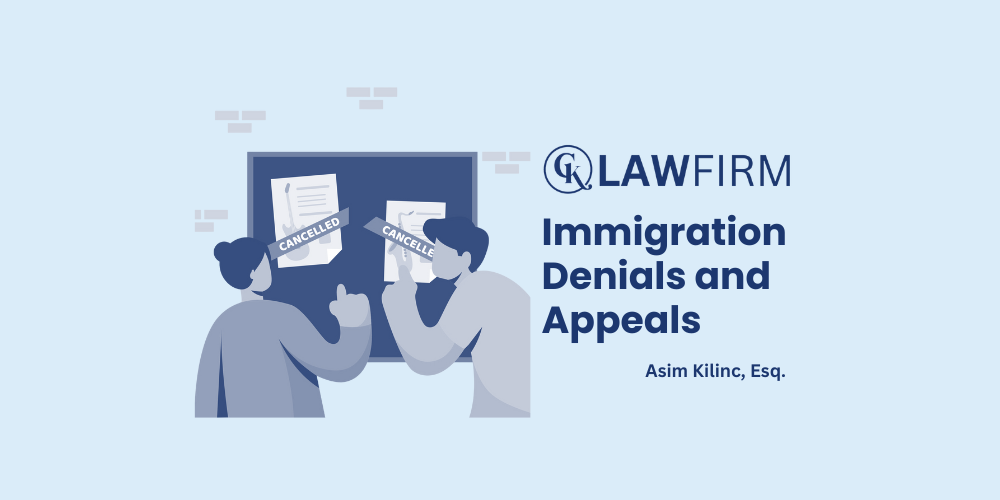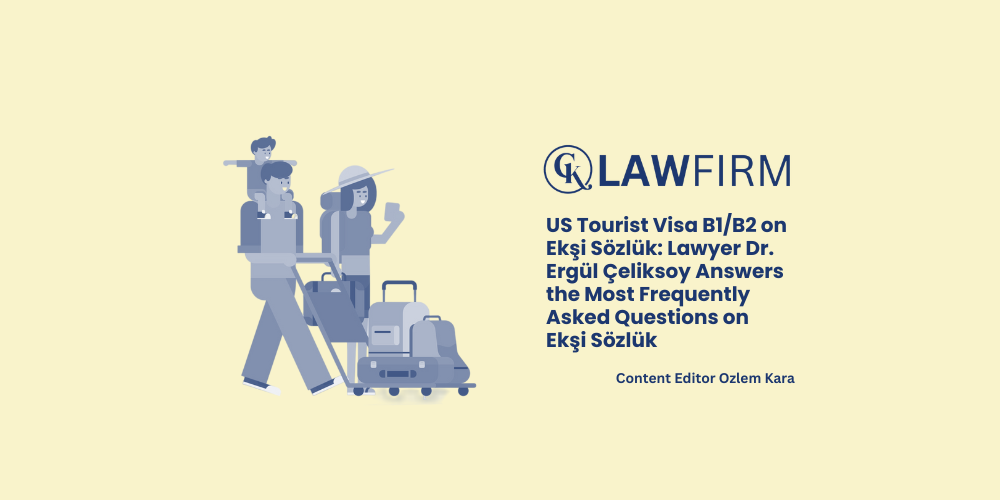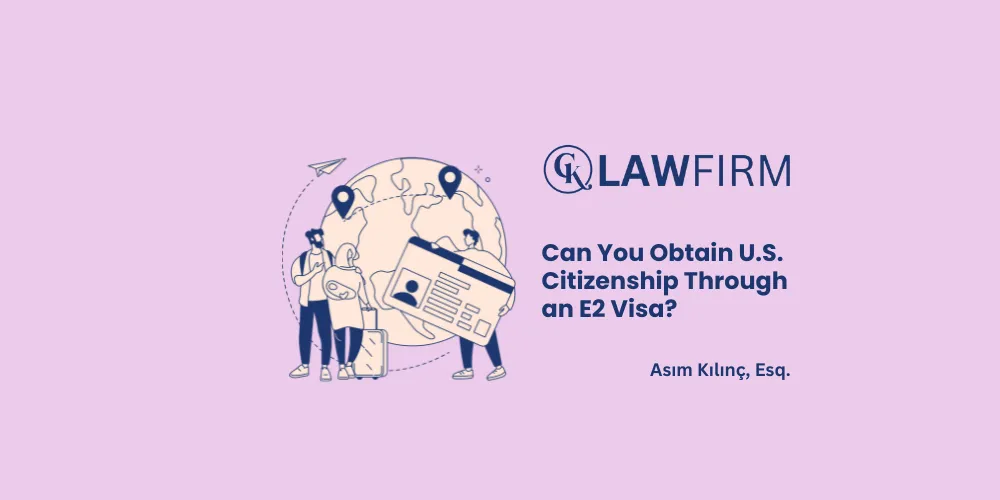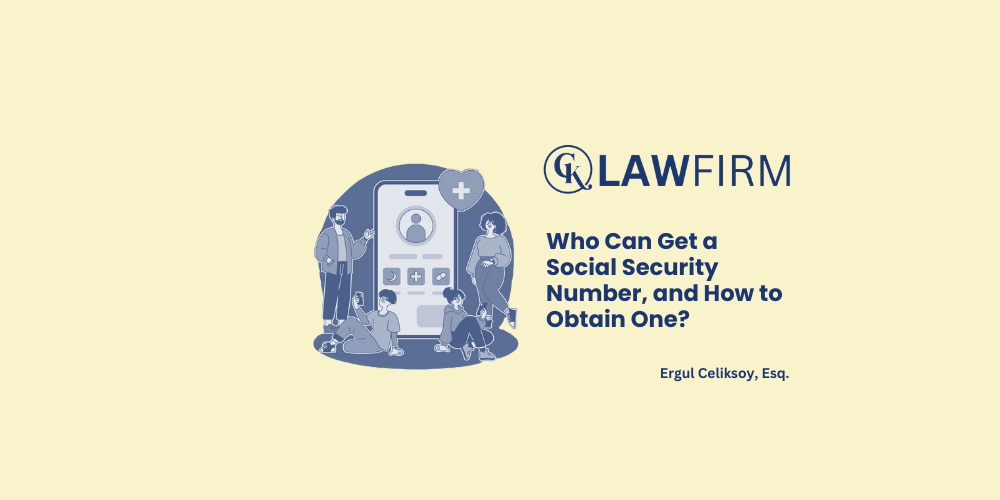Schedule an Appointment with Our Attorneys Now
By Asim Kilinc, Immigration Attorney at CK Law Firm
Receiving a denial on your immigration application can be disheartening and stressful. However, it is not the end of the road. There are steps you can take to address the denial and possibly reverse the decision. This guide will provide advice on what to do if your immigration application is denied and explain the appeals process in detail.
Understanding Immigration Denials
Immigration applications can be denied for various reasons, including:
- Incomplete or Incorrect Information: Missing or inaccurate information on your application.
- Ineligibility: Not meeting the eligibility criteria for the visa or immigration benefit you applied for.
- Lack of Evidence: Insufficient documentation to support your application.
- Criminal Background: Issues related to criminal history or security concerns.
- Failure to Attend Appointments: Missing biometrics, interviews, or other required appointments.
Immediate Steps After a Denial
1. Review the Denial Notice
- Carefully read the denial notice to understand the specific reasons for the denial. The notice will include important information on why your application was rejected and any options for appeal or reconsideration.
2. Consult with an Immigration Attorney
- Seek advice from an experienced immigration attorney to assess your case and determine the best course of action. An attorney can help you understand your options and guide you through the appeals process.
Example: Sarah received a denial notice for her H-1B visa application due to insufficient evidence of her educational qualifications. We reviewed the notice and helped her gather additional documentation to support her case.
The Appeals Process
If you believe the denial was in error, you may have the option to appeal the decision. Here’s how to navigate the appeals process:
1. File a Motion to Reopen or Reconsider
- Motion to Reopen: Request to have your case reopened with new evidence or facts that were not available at the time of the original decision.
- Motion to Reconsider: Request to have your case reconsidered based on the argument that the original decision was incorrect due to a misapplication of the law.
Form I-290B
- Use Form I-290B, Notice of Appeal or Motion, to file either motion. This form must be filed within 30 days of receiving the denial notice (33 days if the notice was mailed).
Supporting Documents
- Include any new evidence or arguments to support your motion. Clearly explain why the original decision should be reconsidered or reopened.
Example: Ahmed’s asylum application was denied. We filed a Motion to Reopen with new evidence of persecution in his home country, which was not available at the time of his original application.
2. File an Appeal with the Administrative Appeals Office (AAO)
- If your motion is denied or if you choose to appeal directly, you can file an appeal with the AAO.
Form I-290B
- File Form I-290B to appeal the decision. Ensure the form is complete and includes all necessary supporting documents.
AAO Review Process
- The AAO will review your appeal and make a decision. This process can take several months, depending on the complexity of the case.
Example: John’s employment-based green card application was denied. We filed an appeal with the AAO, providing detailed legal arguments and additional evidence to support his eligibility.
3. Appeal to the Board of Immigration Appeals (BIA)
- For certain immigration decisions, you may appeal to the BIA. This is typically used for cases involving removal or deportation.
Notice of Appeal
- File a Notice of Appeal with the BIA within 30 days of the immigration judge’s decision.
Supporting Documents
- Include a brief explaining the reasons for the appeal and any supporting evidence.
Example: Maria faced removal proceedings and received an unfavorable decision from the immigration judge. We filed an appeal with the BIA, presenting strong legal arguments to support her case.
Tips for a Successful Appeal
1. Act Quickly
- Time is critical when filing motions or appeals. Ensure you meet all deadlines to avoid missing your opportunity for reconsideration.
2. Gather Strong Evidence
- Collect comprehensive and convincing evidence to support your case. This can include additional documentation, expert testimony, or new facts that were not previously considered.
3. Prepare a Detailed Legal Argument
- Clearly explain why the denial was incorrect, referencing specific laws and regulations. An experienced immigration attorney can help craft a compelling legal argument.
4. Maintain Consistency
- Ensure that all information provided in your appeal is consistent with your original application and any previous submissions.
Example: David’s visa application was denied due to inconsistencies in his travel history. We carefully reviewed all documents, corrected the inconsistencies, and provided a detailed explanation in his appeal.
Alternative Options
If an appeal is not feasible or successful, consider alternative options:
1. Reapply
- You may choose to reapply for the same visa or immigration benefit, addressing the issues that led to the denial.
Example: Jane’s student visa was denied due to missing financial documents. We gathered the required documents and successfully reapplied for her visa.
2. Explore Other Visa Options
- If your circumstances have changed, you may be eligible for a different type of visa or immigration benefit.
Example: Alex’s work visa application was denied. We explored other options and determined that he was eligible for an investor visa, which he successfully obtained.
Conclusion
Handling immigration denials and appeals requires a thorough understanding of the process and careful preparation. By taking immediate action, seeking legal assistance, and presenting strong evidence, you can improve your chances of a successful outcome. At CK Law Firm, we are committed to helping you navigate the complexities of immigration law and achieve your goals. Contact us today for expert legal advice and support.
By Asim Kilinc, Immigration Attorney at CK Law Firm
The USCIS Citizenship Guidance provides a comprehensive overview of the legal and physical custody requirements under sections 320 and 322 of the INA for acquiring and deriving U.S. citizenship. This guide also provides a detailed explanation of derived citizenship processes under section 321 of the former INA, which was in effect prior to the enactment of the Child Citizenship Act of 2000.
This update aims to ensure consistent application of legal and physical custody criteria during the evaluation of citizenship applications. Additionally, the changes are designed to support fair and efficient adjudication of applications for Certificates of Citizenship. The updated guidelines will apply to applications filed on or after November 19, 2024, addressing potential uncertainties in the process.
When you read this article, you will have information about the following topics:
- Legal and Physical Guardianship Requirements Detailed
- New Era in Citizenship Applications
- Legal and Policy Basis: Executive Order 14012
- Impact of the Guide
If you have any questions other than these, please do not forget that you can send them to me via the comments section at the bottom of this article, by sending me a message directly via Linkedln or via the website of CK Law Firm Immigration Law Firm, which I co-founded!
Details of Legal and Physical Custody Requirements
The updated guidance outlines the following criteria for legal and physical custody:
- Legal Custody:
- USCIS has broadened the scope of situations in which a U.S. citizen parent is considered to have legal custody of a child. Retroactive (nunc pro tunc) corrections to custody decisions are clarified.
- The evaluation of informal agreements or private custody arrangements without court orders has been explained.
- In cases where there is no formal custody order, a U.S. citizen parent may still be deemed to have legal custody if they maintain actual and uncontested control over the child.
- Physical Custody:
- Physical custody is recognized when the child resides with the U.S. citizen parent or shares the same dwelling. Criteria for assessing actual living arrangements between the parent and child have been detailed.
- Citizenship Derivation Before the Child Citizenship Act of 2000:
- The guidance clarifies the requirements under the former INA section 321, including legal custody, parental marital status, and the child’s age at the time.
- Applications for Certificates of Citizenship:
- USCIS emphasized that applicants who cannot or do not take the oath of allegiance are not eligible for a Certificate of Citizenship.
A New Era for Citizenship Applications
The updated guidance provides clearer criteria for determining the citizenship eligibility of children of U.S. citizen parents. Detailed procedures and explanations are included to ensure timely and consistent adjudication of applications. For instance, in cases without a formal custody order, additional evidence provided during the application process will be considered.
Legal and Policy Basis: Executive Order 14012
These updates align with the goals of Executive Order 14012, which seeks to restore confidence in the lawful immigration system and promote integration and naturalization for new Americans. USCIS has taken steps to remove barriers to citizenship and enhance transparency and guidance in the process, benefiting both applicants and practitioners.
Impact of the Guidance
This update ensures that USCIS can make fair and transparent decisions in citizenship acquisition and derivation cases. The detailed explanations regarding legal and physical custody requirements will help applicants better understand the process.
For more information, refer to Volume 12, Part H of the USCIS Policy Manual or the relevant Policy Alert page. This guidance is an invaluable resource not only for applicants but also for professionals in immigration law.
For professional assistance, detailed information, or legal consultation, contact us via cklawfirm.org, info@cklawfirm.org, or through LinkedIn.
Who is Attorney Asım Kılınç?
Attorney Asım Kılınç is the co-founder of CK Law Firm and is recognized for his expertise in immigration law and U.S. asylum applications. Kılınç completed his Master’s degree at Southern Methodist University Dedman School of Law and is a member of the Missouri Bar Association, with a focus on U.S. immigration law.
Attorney Kılınç’s extensive knowledge and experience in immigration law have significantly contributed to CK Law Firm’s success in this field. He has actively participated in the preparation of over 1,000 cases, demonstrating his expertise in this area. By providing comprehensive and professional legal support to his clients, he helps them adapt to their new lives in the U.S.
Attorney Kılınç is also well-versed in U.S. asylum applications. He meticulously guides his clients through the process and ensures they receive the best legal advice. He provides top-quality service to clients in matters of citizenship, Green Card, work permits, and other immigration processes, supporting them from start to finish on their journey to U.S. citizenship.
Attorney Asım Kılınç, who solidifies CK Law Firm’s leadership in immigration law and U.S. asylum applications, offers reliable and effective legal consultancy services to clients, assisting them in building a new life in the U.S.
By Ozlem Kara, Content Editor at CK Law Firm
Özlem Kara, the content editor at CK Law Firm, and Ergül Çeliksoy, the founding partner of CK Law Firm, came together on Ekşi Sözlük to answer the most frequently asked questions about the B1/B2 tourist visa. We thank Ergül Çeliksoy for the enjoyable interview.
By reading this post, you will find answers to the following questions:
- What is the B1/B2 Visa?
- What are the Requirements for the B1/B2 Visa?
- What Documents are Required for the B1/B2 Visa?
- What is the Validity and Stay Duration of the B1/B2 Visa?
Hello Mr. Ergül, we would like to know more about you and your career. Could you tell us about yourself?
Certainly. In 2017, I completed my Master’s degree in international law and human rights law at the University of Nottingham and then began my PhD at the same university. In 2022, I earned my Doctor of Law degree from the University of Nottingham School of Law. My publications, research, and articles in my field have gained international recognition. I have handled many cases and now, with the experience I have gained, I provide effective and solution-oriented services to my clients at CK Law Firm, helping them start new lives.
What is the B1/B2 Visa?
The B1/B2 tourist visa is a type of visitor visa granted to foreigners who wish to make short visits to the United States. The B1 visa is used for business trips, while the B2 visa is used for purposes such as tourism, medical treatment, or visiting family and friends. The B1/B2 visa allows the applicant to temporarily enter the US and stay for a certain period.
What are the Requirements for the B1/B2 Visa?
To apply for a B1/B2 tourist visa, certain conditions must be met. Here are the important requirements to consider during the application process:
Requirement 1: Temporary Visit Purpose
You must prove that you intend to stay in the US temporarily and return to your country after a certain period.
Requirement 2: Passport
Your passport must be valid for at least 6 months beyond the end of your planned US trip.
Requirement 3: Financial Ability
You must prove that you are financially capable of covering all expenses during your stay in the US. This can be documented through bank statements, pay stubs, or sponsorship letters.
Requirement 4: Criminal Record
Individuals with no criminal record or any legal issues that could negatively affect the visa application can apply.
Meeting these requirements and providing the necessary documents are crucial for a successful visa application.
What Documents are Required for the B1/B2 Visa?
The required documents for applying for a B1/B2 visa are as follows:
- Valid Passport:
- A passport that is valid for at least 6 months beyond the end of the visa period.
- A passport that is valid for at least 6 months beyond the end of the visa period.
- DS-160 Form Confirmation:
- The confirmation page of the DS-160 application form, completed online, with the barcode.
- The confirmation page of the DS-160 application form, completed online, with the barcode.
- Visa Fee Payment Receipt:
- The receipt showing that the visa application fee has been paid.
- The receipt showing that the visa application fee has been paid.
- Biometric Photo:
- A biometric photo taken within the last 6 months, clearly showing your face. This photo should also be uploaded to the DS-160 form.
- A biometric photo taken within the last 6 months, clearly showing your face. This photo should also be uploaded to the DS-160 form.
- Interview Appointment Confirmation:
- Confirmation of the interview appointment obtained from the US consulate.
- Confirmation of the interview appointment obtained from the US consulate.
- Financial Documents:
- Documents proving that you can cover your travel expenses in the US. For example: bank statements, pay stubs, tax returns, financial sponsorship documents (if another person is covering your expenses).
- Documents proving that you can cover your travel expenses in the US. For example: bank statements, pay stubs, tax returns, financial sponsorship documents (if another person is covering your expenses).
- Documents Showing Intent to Return:
- Documents proving that the applicant will return to their country. For example: a leave of absence letter or work documents, property ownership documents, documents showing family ties.
- Documents proving that the applicant will return to their country. For example: a leave of absence letter or work documents, property ownership documents, documents showing family ties.
- Travel Plan and Documents:
- Documents detailing the purpose, duration, and details of the visit. For example: hotel reservations, flight reservations, invitation letters for events you will attend in the US.
- Documents detailing the purpose, duration, and details of the visit. For example: hotel reservations, flight reservations, invitation letters for events you will attend in the US.
- Invitation Letter:
- If you have been invited to a business meeting, conference, or visit with a relative/friend in the US, an invitation letter.
- If you have been invited to a business meeting, conference, or visit with a relative/friend in the US, an invitation letter.
- Previous Travel Documents:
- Copies of visa and entry-exit stamps from previous travels to the US or other countries.
- Copies of visa and entry-exit stamps from previous travels to the US or other countries.
- Other Supporting Documents:
- Other documents, such as a work contract, work ID, or student certificate, if necessary.
These documents must be submitted to the consulate when applying for a US B1/B2 visa. It is important that the documents are complete and accurate for a successful visa application.
What is the Validity and Stay Duration of the B1/B2 Visa?
Key details regarding the validity and stay duration of the B1/B2 visa are as follows:
- Validity Period: The B1/B2 visa typically has a validity period of 1 to 10 years. The validity period of the visa depends on the applicant’s situation, the information provided during the application, and the evaluation of the US consulate. The B1/B2 visa often allows for multiple entries, meaning you can enter the US multiple times during the visa period.
- Stay Duration: The US Customs and Border Protection (CBP) officers determine how long you can stay in the US after entering. Generally, those entering with a B1/B2 visa are granted a stay of up to 6 months. However, this duration may be shorter, depending on the CBP officer’s evaluation. The I-94 form (or the electronically recorded entry document) you receive upon entry determines your stay in the US. You must leave the US by the date specified on this form. The stay duration is independent of the visa’s validity period.
- Extending the Stay: If you wish to extend your stay in the US, you can apply to USCIS to request an extension of your visa stay. This application must be made before the stay duration on the I-94 form expires. Your application will be evaluated, and if your reasons are sufficient, you may receive an extension.
- Difference Between Visa Duration and Stay Duration: The visa duration determines the periods when you can enter the US. However, the length of stay after entering depends on the CBP officer’s determined duration. You can enter and exit the US multiple times during the validity period of your visa, but it is important to pay attention to the stay duration granted at each entry.
In conclusion, providing accurate information and documents at every stage of the application is crucial. Due to the complexity of the process and legal requirements, it may be beneficial to seek support from an immigration attorney. Remember that you can reach me directly via CK Law Firm’s website, at info@cklawfirm.org, or on LinkedIn!
Asım Kılınç, Immigration Attorney, CK Law Firm
Many international investors turn their entrepreneurial dreams into reality by launching a business in the United States under the E2 Investor Visa program. However, one of the most frequently asked questions we encounter is: “Can I obtain U.S. citizenship through the E2 Visa?” In this article, we aim to clarify this question and provide an overview of the E2 Visa’s essential details. By the end of this post, we hope to clear up any lingering confusion regarding your path to living and working in the U.S.
Below are the key topics we will cover:
- What Is the E2 Investor Visa and What Does It Offer?
- E2 Visa and U.S. Citizenship: Is Direct Citizenship Possible?
- Entering and Exiting the U.S.: Does the E2 Visa Offer Flexibility?
- Which Countries Qualify for the E2 Visa?
- How Long Is an E2 Visa Valid and How Can You Extend It?
- How to Select the Right Business for an E2 Visa Application?
- How Long Does It Take to Obtain an E2 Visa?
If you have any additional questions or concerns outside the scope of these topics, feel free to reach out via our website. For more personalized inquiries, you can always connect with me on LinkedIn. Enjoy the read!

What Is the E2 Investor Visa and What Does It Offer?
The E2 Investor Visa is a non-immigrant visa that allows citizens of certain treaty countries to establish a new business or invest in an existing venture in the United States. Turkey is one of the many nations with a qualifying treaty, giving its citizens the opportunity to apply for an E2 Visa by making a substantial investment and presenting a solid, sustainable business plan.
Below are some key benefits the E2 Visa offers:
- Family Inclusion: Your spouse and any children under 21 can live, study, and (in the case of your spouse) work in the U.S.
- Unlimited Entries: As long as your E2 Visa remains valid, you can enter and exit the United States whenever you need.
- Long-Term Business Opportunities: You can continue to live and work in the U.S. through your E2 Visa as long as your business remains viable and profitable.
These advantages make the E2 Visa an attractive pathway for entrepreneurs eager to launch or grow their businesses in the U.S. The critical question, however, is whether this visa paves the way toward permanent residency (Green Card) or U.S. citizenship.
E2 Visa and U.S. Citizenship: Is Direct Citizenship Possible?
An E2 Visa does not directly lead to a Green Card or U.S. citizenship. In other words, the answer to the question, “Can I become a U.S. citizen through the E2 Visa?” is “No, not directly.” However, there is an indirect pathway you can pursue:
- A Comprehensive Strategy: If you expand your business in the United States and contribute significantly to the economy, you could become eligible for other investment-based visas such as the EB-5. In essence, this involves changing your immigration status.
- Status Adjustment: If the business you established under the E2 Visa continues to generate revenue and create jobs, you may qualify to shift to a different visa category that grants permanent residence (Green Card).
Ultimately, an E2 Visa can serve as a stepping stone to U.S. citizenship, provided you craft a personalized plan and follow a detailed roadmap. For instance, starting with an E2 investment, growing your venture, and creating job opportunities can pave the way to applying for an EB-5 Visa. After you secure a Green Card, you may eventually progress to U.S. citizenship.

Entering and Exiting the U.S.: Does the E2 Visa Offer Flexibility?
Another common question concerns the ease of traveling in and out of the U.S. under the E2 Visa. The good news is that the E2 Visa permits you to enter or leave the United States as often as your business needs dictate.
Each time you re-enter the country, you will need to show the U.S. Customs and Border Protection officer that your primary purpose is to manage your U.S. business. Because the E2 Visa is categorized as a non-immigrant visa, you must demonstrate that you do not intend to remain in the United States permanently. Providing clear evidence of your ongoing business operations typically ensures a smooth entry and exit process.
Which Countries Qualify for the E2 Visa?
As mentioned, the E2 Visa is available to citizens of countries that maintain a bilateral treaty of commerce or navigation with the United States. Turkey is one of these nations, but there is a long list of other eligible countries as well. If you do not hold Turkish citizenship and wish to apply for an E2 Visa, here is a more detailed overview of eligible countries. Please note that the duration of the visa can vary from a few months to several years based on each country’s specific treaty terms.
- Argentina
- Armenia
- Austria
- Belgium
- Bulgaria
- Canada
- Chile
- Colombia
- Costa Rica
- Croatia
- Czech Republic
- Denmark
- Estonia
- France
- Germany
- Grenada
- Honduras
- Ireland
- Italy
- Jamaica
- Japan
- Latvia
- Luxembourg
- North Macedonia
- Morocco
- Netherlands
- New Zealand
- Norway
- Pakistan
- Panama
- Paraguay
- Philippines
- Romania
- Slovenia
- South Korea
- Spain
- Suriname
- Taiwan
- Tunisia
- Turkey
- United Kingdom
Some countries have specific visa validity periods:
- Albania – 3 years
- Australia – 4 years
- Finland – 2 years
- Mongolia – 3 years
- Singapore – 2 years
- Slovak Republic – 2 years
- Sweden – 2 years
Additional countries:
- Bosnia and Herzegovina
- Cameroon
- Germany (listed again; included in many official treaty country lists)
- Kazakhstan
- Kosovo
- Liberia
- Lithuania
- Mexico
- Montenegro
- Poland
- Serbia
- Senegal
Countries with shorter reciprocal validity (often three to six months):
- Azerbaijan – 3 months
- Bahrain – 3 months
- Bangladesh – 3 months
- Congo (Brazzaville) – 3 months
- Congo (Kinshasa) – 3 months
- Egypt – 3 months
- Ethiopia – 6 months
- Iran – 3 months
- Jordan – 3 months
- Kyrgyzstan – 3 months
- Moldova – 3 months
- Oman – 6 months
- Thailand – 6 months
- Ukraine – 3 months
These validity periods are based on specific reciprocity agreements and can influence how long your E2 Visa remains valid. Always check the most recent U.S. State Department guidance for updated information.
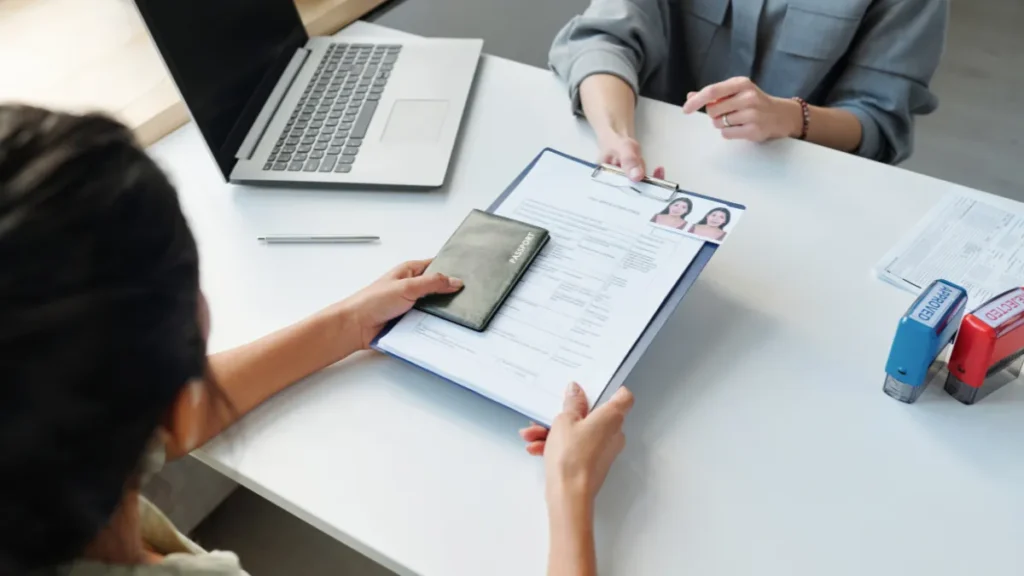
How Long Is an E2 Visa Valid and How Can You Extend It?
The answer to this question largely depends on your country’s treaty agreement with the United States, as well as guidelines set by the U.S. consulate. However, in practical terms—particularly for Turkish nationals—here is how it typically works:
- Up to 5 Years Initially: For citizens of Turkey, the initial E2 Visa is generally granted for up to five years.
- Renewal Options: As you approach the end of that five-year period, you can renew your visa indefinitely, provided you can demonstrate that your business remains active and profitable.
If you aim to stay in the U.S. long-term and expand your business, you should prepare a thorough renewal application each time. Additionally, you can explore other visa categories, such as the EB-5 Investor Visa, to secure a more permanent future in the United States.
E2 Visa Investment Amount
The E2 Visa investment amount largely revolves around whether your capital is deemed “substantial” for the specific business you plan to operate. It’s essential to research various E2 Visa business ideas and select a path that aligns with your financial resources while offering a strong likelihood of approval.
When choosing a business for the E2 Visa, it’s crucial to demonstrate that your funds are actively invested in a functional enterprise. For example, merely purchasing a home in the United States does not qualify as an active investment and may lead to a visa denial.

How to Select the Right Business for an E2 Visa Application?
Choosing a business that meets E2 Visa criteria is a critical step in securing your approval. The U.S. Citizenship and Immigration Services (USCIS) evaluates whether your investment is “substantial,” “important,” and involves a reasonable degree of risk. Essentially, you need to demonstrate you’re actively investing in a venture poised for growth in the U.S. market.
- Tourism: Examples include purchasing or operating a hotel, motel, or travel agency.
- Food & Restaurant: This can range from opening a café or full-service restaurant to acquiring a franchise.
- Consulting & Technology: Fields such as information technology, software development, or marketing offer multiple opportunities for profitable ventures.
A well-researched market strategy and a comprehensive business plan are essential for a successful E2 Visa application. Ensure that the sector you choose aligns with your investment capacity and showcases how your enterprise will contribute to the U.S. economy.
How Long Does It Take to Obtain an E2 Visa?
It’s challenging to give a definitive answer to the question, “How long does it take to get an E2 Visa?” because the timeframe depends on various factors:
- Consulate Workload: The availability of interview appointments and the time it takes for the consular officer to process your application.
- Application Preparedness: Thoroughly documented and professionally presented applications typically result in quicker decisions.
- Additional Reviews: If your business model or plan is particularly complex, you may be asked to provide extra documentation, extending the overall processing period.
Overall, E2 Visa approvals can range anywhere from a few weeks to several months.
If you’re aiming to use the E2 Visa as a step toward U.S. citizenship and start a new journey in the United States, the details shared throughout this article can help guide your strategy. Ultimately, success hinges on proper planning and a well-prepared application. For additional support, you can reach out to CK Law Firm official website, or connect with me on LinkedIn for more personalized guidance.
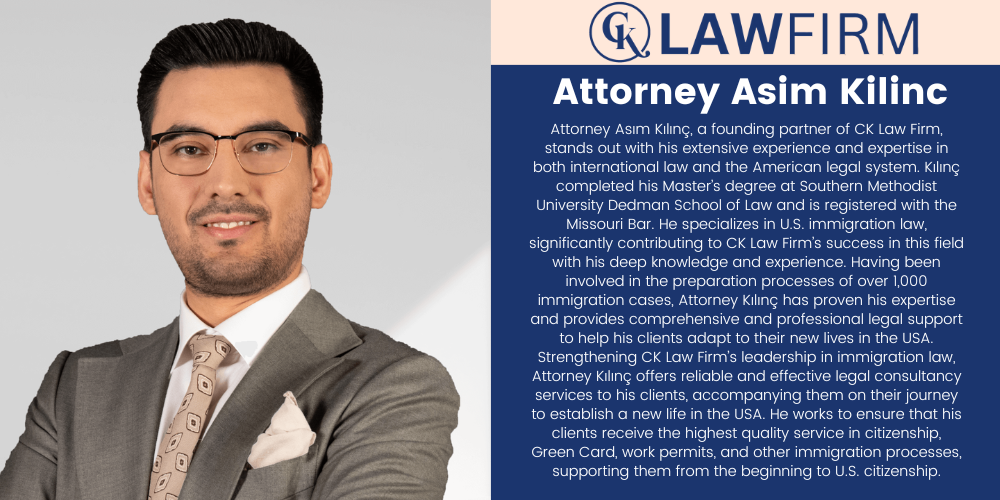
By Ozlem Kara, Content Editor at CK Law Firm
According to official government data, President Biden’s decision to restrict asylum claims at the southern border has led to a significant decrease in the number of migrants released into the interior of the United States. This policy was implemented as part of measures aimed at reducing illegal border crossings in the U.S.
Impact of the New Immigration Policies
In June, President Biden made substantial changes to the immigration system by issuing several executive orders that restricted the right of most migrants to seek asylum in the U.S. These steps resulted in a noticeable decline in the number of migrants crossing the U.S.-Mexico border illegally. In July, the number of migrants apprehended outside official entry points at the southern border dropped to 56,400, the lowest level in nearly four years. Experts attribute this decrease to the hot summer months and Mexico’s crackdown on migrants heading north.
Decrease in Migrant Releases
One of the most notable outcomes of these new policies has been the significant reduction in the number of migrants released by the U.S. Border Patrol. In July, the Border Patrol released far fewer migrants with court notices compared to previous months. For example, in May, this number was 62,000, but it dropped to 12,000 in July.
These strict measures have also increased the rate at which migrants are subjected to expedited removal procedures. In July, 50% of apprehended migrants underwent these procedures, marking a significant increase from previous months.
Restricted Access to Asylum Rights
Under U.S. law, asylum is offered to provide legal protection to foreign nationals fleeing persecution for specific reasons. However, changes in President Biden’s asylum policies have severely restricted migrants’ access to this right. Since June, there has been a substantial decrease in the number of migrants screened by asylum officers. Additionally, new rules have made it more difficult for migrants to express their fear of harm, increasing the risk of asylum claims being denied.
Future Outlook
The Biden administration anticipates that if these policies continue to be enforced, the decline in illegal border crossings will persist. However, there is a risk that these policies could be overturned in federal courts. Immigrant rights advocates, in particular, argue that Biden’s policies have negative consequences for migrants.
For more details, visit the CBS News website.
At CK Law Firm, we closely monitor current developments in U.S. immigration law and continue to provide our clients with the most accurate information. Contact us for more information on asylum claims and other immigration processes.
By Ergul Celiksoy, Immigration Attorney at CK Law Firm
In the United States, the Social Security Number (SSN) is a critical component for personal identification and financial transactions. This number is essential for individuals who will work, pay taxes, or apply for social security benefits in the United States. In this post, we will explore who is eligible to obtain a Social Security Number and how the application process works:
- What is a Social Security Number?
- Who Can Obtain a Social Security Number?
- Application Process for a Social Security Number
- The Importance of the Social Security Number
- Alternatives for Those Unable to Obtain a Social Security Number
If you have additional questions, please feel free to reach out through the comments section below, send me a direct message on LinkedIn, or contact me through the website of CK Law Firm, the immigration law firm I co-founded!
What is a Social Security Number?
A SSN is a number used by the U.S. government to identify individuals. It is used for many important transactions, including social security benefits and tax filings. Additionally, employers, banks, and other financial institutions use this number to verify an individual’s identity.
Who Can Obtain a Social Security Number?
Several categories of individuals can apply for a SSN, typically divided into three main groups:
- U.S. Citizens:
- Individuals born in the U.S. or who have gained citizenship can obtain a Social Security Number from birth or after gaining citizenship. Those born in the U.S. can apply for this number with a birth certificate. For American citizens, the process is usually straightforward and is often completed shortly after birth.
- Permanent Residents (Green Card Holders):
- Green Card holders, who have the legal right to live and work in the U.S., can apply for a Social Security Number by contacting the Social Security Administration. Green Card holders need this number to find work and conduct banking transactions in the U.S.
- Temporary Work Permit Holders:
- Foreign nationals in the U.S. on temporary work visas such as H-1B, L-1, or E-2 may also apply for a Social Security Number. To apply, these individuals must have a valid work permit and be legally authorized to work in the U.S. and meet tax filing requirements.
Application Process for a Social Security Number
To obtain a Social Security Number, applicants must follow specific steps and prepare required documents. The application process includes the following steps:
Preparing Required Documents
Applicants must prepare the following documents to apply for a SSN:
- Identity Document: U.S. citizens must provide a birth certificate or passport. Foreign nationals must provide a valid passport or U.S. entry visa.
- Immigration Status Documents: Green Card holders must provide a copy of their Green Card, while those on temporary visas must present work authorization documents.
- Work Permit: Individuals on temporary work visas must have a valid work permit issued by U.S. Citizenship and Immigration Services (USCIS).
Submitting Application to the Social Security Office
Applicants must visit the nearest Social Security Administration (SSA) office to submit their application. During the process:
- Forms are Completed: The application form provided by the SSA must be filled out accurately. This form requests personal information, immigration status, and contact details.
- Documents are Submitted: The prepared documents must be submitted to the office. These documents are used to verify the applicant’s identity and immigration status.
- Identity Verification: The SSA office will check the validity of the documents and confirm the applicant’s identity.
- Processing the Application
Processing the application typically takes 2-4 weeks. During this time, the applicant will receive their Social Security card via mail. Once approved, the applicant can use the number for various transactions.
The Importance of the Social Security Number
The SSN is necessary for many essential processes in the U.S. Here are a few examples:
- Tax Filing: Social Security Numbers are used when filing income tax returns. Employers track their employees’ income and tax information using this number.
- Employment and Banking: The SSN is required for job applications, opening bank accounts, and applying for credit.
- Social Security Benefits: This number is used when applying for Social Security benefits. These benefits include retirement, disability, and survivor payments.
Alternatives for Those Unable to Obtain a Social Security Number
Not everyone may be eligible for a Social Security Number. Foreign nationals in the U.S. on temporary visas without work permits, or those on tourist visas, may consider alternative options:
- Individual Taxpayer Identification Number (ITIN): Those who cannot obtain a SSN can apply for an ITIN through the U.S. Internal Revenue Service (IRS). The ITIN is necessary for individuals who need to file a tax return. While ITINs can be used in place of Social Security Numbers, they are not sufficient for social security benefits or certain financial transactions.
Conclusion
The SSN plays a critical role in living and working in the U.S. U.S. citizens, Green Card holders, and individuals with temporary work permits can obtain this number to legally work and carry out financial transactions. The application process requires proper documentation and accurate form completion. For more information and legal assistance, feel free to contact us at cklawfirm.org, via email at info@cklawfirm.org, or through LinkedIn.
Who is Attorney Ergül Çeliksoy?
Attorney Dr. Ergül Çeliksoy is a founding partner of CK Law Firm and also serves as an Assistant Professor of Law at the University of Nottingham. With extensive experience in U.S. immigration law, Dr. Çeliksoy completed a Master’s degree in international law and human rights law at the University of Nottingham in 2017, followed by a Ph.D. at the same university. His Ph.D., completed in 2022 at the University of Nottingham School of Law, marked a significant milestone in his academic career. Dr. Çeliksoy has published extensively in leading academic journals and is internationally recognized for his expertise in modern slavery, criminal justice, and criminal law. As a member of the California Bar, Dr. Çeliksoy offers exceptional service to his clients, particularly in U.S. immigration law cases. His expertise and experience in immigration law significantly contribute to CK Law Firm’s work in this area.
Dr. Çeliksoy provides comprehensive and strategic solutions to his clients in immigration law cases, helping secure their legal status in the U.S. His work on human rights and immigration processes, particularly in modern slavery and criminal law, effectively addresses the complex legal issues immigrants face. Dr. Çeliksoy reinforces CK Law Firm’s leadership in immigration law by offering reliable and effective legal consulting services to his clients, helping them build new lives in the United States.
Subscribe to Our Newsletter
Subscribe to our newsletter to stay informed about the latest announcements and articles written by our attorneys on U.S. immigration processes.
Sobre Nosotros
Contáctanos
+1 (945) 527- 23 22
Correo electrónico
info@cklawfirm.org
Dirección
2800 Regal Rd #102, Plano, TX 75075

All Rights Reserved by CK Law Firm.


